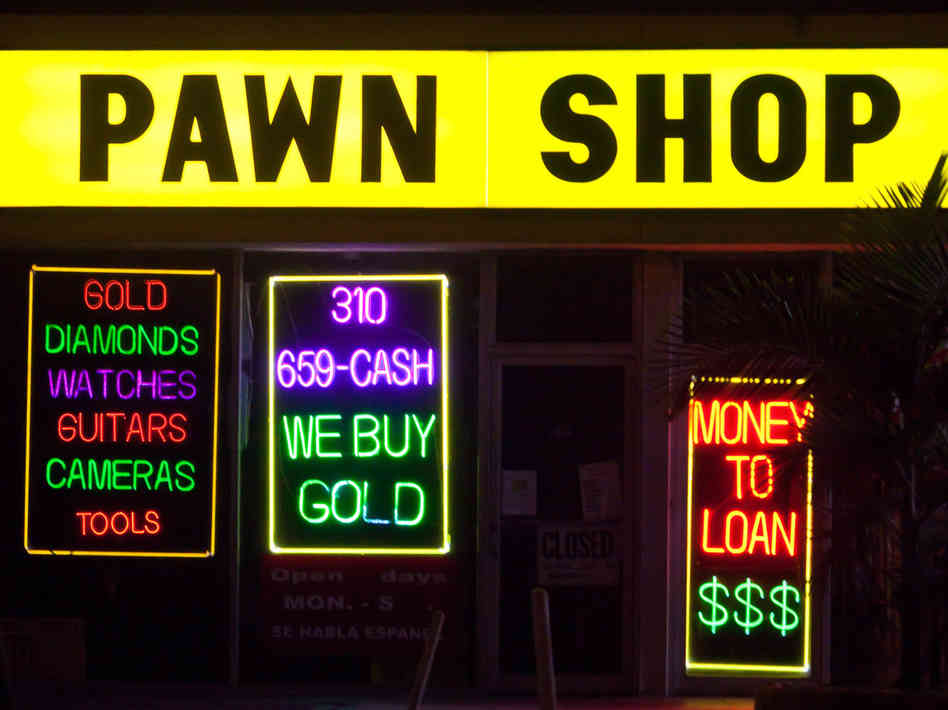Pawn Shops were the largest source of consumer credit until 1964 before the flood of institutional credit.
Pawnbrokers have been around since ancient times and even kicked out of the Temple by Jesus for getting greedy on half-shekel premiums. Whether or not they’ve recovered from the incident is your call. But, one thing is for sure: Pawn brokers are filling the huge credit vacuum left by banks who have trillions in reserves but not a penny to lend. Unlike banks, the money a pawnbroker lends is based on real goods — first yours, then theirs.
After a Tivo marathon of Pawn Stars I’d seen Rick, Corey and the Old Man go through their process 50 times or so. Then, the was the last straw. Why does Rick let customers see his expert appraisals?!
A guy comes into the shop hoping his cuckoo clock may be worth something, but, has no idea. Rick thinks it’s original and calls an expert. By the time the expert is done blabbing in front of the customer a deal is struck for $4,200. Whuh? That guy would have been thrilled to get $500 bucks. Rick paid $3700 more than he had to! What’s going on here? This is terrible business . . . unless. . . you have a TV show. Then, it’s marketing genius!
Of course, cheating or abusing customers is not only wrong, but, the quickest way to lose a legitimate business. But, when it comes to the business of pawn shops . . .
Appraisals are the Heart
Modern pawn shops offer lots of services. None of them work without the shops ability to appraise the value of the goods their services revolve around. The History channel describes the Old Man as “The Appraiser” for good reason.
The ability to glean the value of a wide range of items makes or breaks a pawn shop. The quality of the appraisal, and negotiated price, determine the maximum profit potential for each item. Jabbering everything you know about an item puts the customer on an equal footing with the business. In fact, it provides a free service to the customer outside the scope of the pawn business. Pawn customers need money or a loan. If they need an expert appraisal then either . . .
Charge for Appraisals
Or don’t provide them. If you have to bring in an expert then charge a flat fee plus whatever the expert charges you (And have an agreement with the expert that you get first dibs). If the item is not worth an appraisal fee then the customer won’t purchase one.
So, why does Rick give away the heart of his business to folks who just need a few bucks to pay the rent? He doesn’t. The Pawn Stars are savvy businessmen using . . .
Appraisals as Marketing
You gotta love these guys. They take a $3700 loss on an item while demonstrating their expertise to TV viewers across the country. In other words, the ‘loss’ they take in front of the TV cameras is the cheapest marketing you could buy. What other pawn shops get 1000 customers a day and are doubling their store space?
Rick is talking to the TV cameras to demonstrate his shop’s expertise. He’s giving up some of the profit on each item pawned in exchange for marketing his business all over the country. And it’s working, fabulously! While I’m questioning their appraisal process these guys are marketing them all the way to the bank!
In one episode, Corey and Chum Lee are cleaning up the storage room and discover a statue that’s off pawn and should have been put up for sale. The item was a statue that Rick estimated could be sold for $2000. The Old Man comes in and recognizes the statue as one of his ‘buys’ for which he paid $200. I guess the TV cameras weren’t on for that one and the Old Man didn’t blab what he knew the statue to be worth. That’s the pawn business. The customer was happy enough with $200 to make the trade or he wouldn’t have sold it.
These guys are no dummies. Rick, The Old Man, Big Hoss, and even Chum Lee (For video games) are expert appraisers in their own areas.
Gold & Silver, The Blood
If Appraisals are the heart of the pawn business then gold and silver are the blood.
Watch the show closely and you’ll hear the Pawn Stars answer the phone with the greeting “Gold & Silver?”. That’s because the name of the shop is Gold & Silver Pawnshop. The “Old Man” is often seen counting money at his desk surrounded by silver bars. And notice the amount of silverware, superbowl rings and jewelry in the display cases in the background.
Antique guns, helicopters, cuckoo clocks and pinball machines are great fun! But, make no mistake: Their purpose is to draw attention to a business providing credit or reselling the equity in real things. More often than not those real things are gold & silver.
Few pawn items have the benefit of an international exchange to set price. That takes much of the risk out of appraising the real value of an item made with precious metals. Sure, the price changes every second, but, so does the price of everything if there was a ticker tape to broadcast it.
From a business vetting standpoint the gold & silver aspects of the pawn business are something that should interest you, or you’d be happy to learn more about. Pawnbrokers require a second hand dealers license (same as precious metals license) or a pawnbrokers license to buy and sell gold and silver. In Florida, the scales used to weigh gold are regulated by the department of agriculture, which is ridiculous.
Inside Scoop
When selling jewelry or odd lots of gold or silver to a pawn shop bring a nickel with you. It should weigh exactly 5 grams. If it weighs less, or, the pawnbroker doesn’t weigh your item, at all, then find another shop. So much for the department of agriculture.
Sell or Pawn?
Judging by Pawn Stars you’d think the business was 98% sales and 2% pawn. It’s actually 40% sales and 60% pawn (According to one of the fun facts between commercials). One episode showed they had almost 4000 items in the back of the shop!
Anyone contemplating the pawn business should be good with managing thousands of inventory items. And police require reporting, on a daily basis, of everything that’s purchased. Another tracking hassle is that no item may be sold until it sits in the ‘buy room‘ for 30 days and checked for theft. 30 days can make or break the sale of an ipod should a new generation come out making the old one obsolete.
From the customers point of view it’s either sell your item for a fraction of its value or take out a loan based on a fraction of its value. The customer will talk up the value of their item and convince the broker he wants the item back. That’s to persuade the broker that he’ll be paying the interest and will pay back the principal of the loan.
From the brokers point of view he has to accept the risk of not being able to sell the item or the risk of the customer not making loan payments. Either way, he’ll be left with the item. It’s his job to make sure he can resell the item for a profit if the customer doesn’t pay back the loan.
In Florida, the maximum interest allowed is 25% per month. If you come back in two weeks you may negotiate an extension on your 30-day loan. If you don’t pick it up after 30 days, or whenever you extended the loan to, you have a 30-day grace period (At the same interest rate). If you don’t pick it up it becomes property of the pawn shop on day 61.
Inside Scoop
The pawn broker doesn’t want your motorcycle helmet or guitar. He’s got lot’s of them in the back. What he wants is for you to make the interest payment, pay back the loan and pick up your item. Of course, he’s loaned you an amount that he can still profit on if he sells your item. But, unless it’s an exceptional item, the interest payment is what he wants. Even better, if you get the item back you’ll have it for another pawn and interest generating loan, later.
If you have a good track record of paying the interest and getting your item back there will be room to negotiate a higher price on the next item you pawn.
Competition
The competition for pawn shops are:
- Garage sales
- Word of mouth
- Newspaper
- Ebay
- Craigslist
- Flyers at the market
- Bargain trader
- Loan from Friends & Family using the item as collateral
If you’ve got time, and no money, then a little sales work puts the money into your pocket. If not, then the pawnbroker does the work and you get less money.
Most items have less value to others than to us as personal possessions. Whether you discover the objective value, yourself, or hear the adjusted value from the pawnbroker (After building in his profit) there’s no sense in blaming the messenger. It’s unlikely you’ll hear the pawnbrokers true appraisal for a valuable item, even if he knows it. Pawn shops are not the Antiques Road Show you’d expect by watching the Pawn Stars.
There’s nothing wrong with needing a bridge loan, now and then. But, pawning will cost you 25% of the loan amount on a monthly basis. The loan amount does not equal the full value of the item because that would leave no room for the pawn broker to profit from the items sale if you default. But, you’ll be chipping away at the value of the item at an alarming rate. That’s the nature of the pawn business.
Some customers interviewed after their Pawn Stars deal say they’ll just sell on ebay. That’s the right thing to do if you’ve got the time. But, there is something to be said for a trip to the pawn shop, talking with real people and quick money to pay the rent.
Restoring Disasters
One of the unique aspects of the Pawn Stars are their restorations. They buy disasters and restore them to original, sometimes better, condition. Rick has a rolodex of restorers that perform these miracles.
In one episode Rick buys a 1992 Schweizer helicopter for $10K. The thing was in pieces after a crashed landing. Although his expert quotes a price of $100k for the restoration he says it would then sell for $150k. Eventually, Rick gets the Old Man to agree to the restoration which turns out to be a stunning achievement. The episode ends with the Old Man taking off from North Vegas with a smile on his face and the aviation expert saying they could probably get $160k for it.
Great TV.
These restorations are wonderful and have the most profit potential of any part of Rick’s business. However, there’s one aspect to take into consideration that’s not mentioned on the show. If you were looking to buy the helicopter in question would you prefer one that had been restored from a crash or had never crashed?
If you’d prefer the one that had never crashed then:
- You’d want to pay less for the restored helicopter.
- The restored helicopter. would have to be in better shape than the non-crashed version.
The resale prices on the show are overstated. What the experts say its worth and what it actually sells for are two different things. But, hey, it’s great TV, either way.
Creating the Market
In many cases, this is irrelevant because there’s no market, whatsoever, for the non-restored version. In one episode Rick restores a 1930’s gas pump into a thing of glory. There was no market, at all, for the non restored version other than Rick, himself. The restoration created the market.
Now THAT’S good business!
Pawn for Hard Times?
Vetting a business you’ll be running yourself is more than learning the facts. It’s making decisions about the opportunity cost of not running any other business during this period of your life. To assist my wife in the vetting process I created a business vetting mindmap as a way of describing how to Vett Any Business Idea in 10 Minutes. It’s free and may it assist in discovering Your Optimal Buisiness.
Pawn Broker Characteristics
Pawn brokers seem to:
- Have a talent for appraising value. Part of that is knowing when to call in an expert.
- Have a collectors’ mentality and eclectic interests.
- Be willing and competent to deal with items for which they have no interest.
- Understand value and money and the difference between them.
- Be willing to buy, fix up and sell.
- Be comfortable negotiating price and loan terms.
- Be tactful and firm with customers who disagree.
- Be comfortable in a cluttered environment.
- Be able to manage inventory.
- Be organized enough to adhere to all the regulations and compliance that surround the business.
You’ll want to already have many of these characteristics, not just be willing to acquire them because ‘pawning is big, right now’.
Price of Admission
Pawning is highly regulated. Varying by state, you’ll need to obtain or have a:
- Banking and lending license.
- Second hand dealers license (Or Precious metals license)
- Pawnbrokers license
- FFL if you’re buying/selling guns.
- Large positive net worth.
You’ll be subject to extensive criminal background checks to obtain the licenses, above. And a large positive net worth is required to fund the beginning inventory of gold and silver. Pawn brokers give loans, they don’t get them.
Security
For this pure cash business security is a major concern complicated by customers needing close up access to gold and silver items. On one episode, Cory refers to the number of employees working at the shop and it was more than I expected. I’ll bet some of those folks are needed for extra security.
Related Possibilities
No need to be the owner. You could also be:
- An employee.
- A consultant appraiser in the area of your expertise.
- A restorer.
Pawn Shop +
If pawn shops become the new hub for consumer credit then why not make it a fun gathering place? Rent Movies, Instruments, serve coffee, provide web access, whatever.
I hesitate to recommend Check Cashing, Payroll Loans and Car Title Loans because they have a reputation for taking advantage of people when they’re down. If you can provide these services, fairly, then they wouldn’t require any more infrastructure or regulatory hoops than you’ve already taken on for your pawn business.
Also, a pawn shop could have a coin shop, and vice versa. Pawn & Coin or Coins & Pawn is a natural combination.
Beauty’s in the Eye of the Gold
Beauty may be in the eye of the beholder, but, all you have time for is the gold. If you add coin shop services then deal in bullion only. If people bring in collectible coins give them a fair offer on the bullion content only. They’ll get the picture and you’ll bypass the hassles and risks of collectible coins.
Parting Facts & Words
- Pawning is a multi billion dollar business with some 125,000 shops in US and several traded public companies.
- The National Pawnbrokers Association says the average loan is $80 and that most customers are employed.
- Customers tend to be primarily men, homeowners around 35 years of age that need quick money because they have no line of credit.
- Not all pawn shops sell guns due to the additional burdens of the FFL license and paperwork required.
Pawn shops are getting busy partly due to the TV show and mostly because people need them to supply credit. Banks aren’t lending, credit cards are maxed out and millions are out of work for the foreseeable future.
If you’ve exhausted your options (See competition section above) and can save bank fees, eviction, payroll or getting the heat shut off then, by all means, at least pawn shop loans are based on real goods.
For those vetting the pawn business, however, more customers don’t necessarily mean more profit. If new pawn customers default on their loans it leaves behind a pile of stuff. If nobody wants, or can afford, that stuff then the pawn shop just becomes a huge repository of unsaleable junk.
That’s not the kind of bubble you’ll need to be a Pawn Star.




